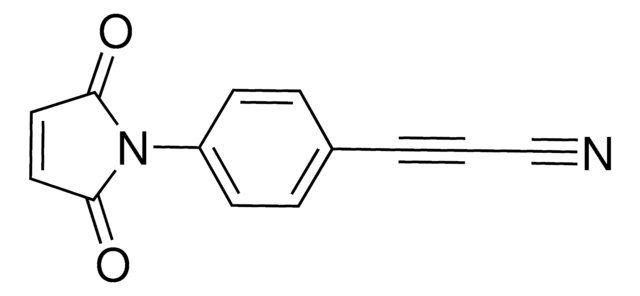803391
SM(PEG)24 (PEGylated, long-chain SMCC crosslinker)
Synonym(s):
PEGylated SM(PEG)24
About This Item
Recommended Products
form
powder
Quality Level
mol wt
1394.55
reaction suitability
reagent type: cross-linking reagent
storage condition
desiccated
shipped in
ambient
storage temp.
−20°C
SMILES string
O=C(N1OC(CCOCCOCCOCCOCCOCCOCCOCCOCCOCCOCCOCCOCCOCCOCCOCCOCCOCCOCCOCCOCCOCCOCCOCCOCCNC(CCN2C(C=CC2=O)=O)=O)=O)CCC1=O
InChI
1S/C62H111N3O31/c66-57(5-8-64-58(67)1-2-59(64)68)63-7-10-73-12-14-75-16-18-77-20-22-79-24-26-81-28-30-83-32-34-85-36-38-87-40-42-89-44-46-91-48-50-93-52-54-95-56-55-94-53-51-92-49-47-90-45-43-88-41-39-86-37-35-84-33-31-82-29-27-80-25-23-78-21-19-76-17-15-
Related Categories
General description
Application
- The study of chemical cross-linking of glyceraldehyde-3-phosphate dehydrogenase (GAPDH) and RNAses using the high-mass MALDI-MS technique.
- Preparation of protein G-liposomal nanovesicles applicable as sensors in the detection of gentamycin in the milk sample.
- Conjugation of catalase to streptavidin, which is helpful in the detection of analytes at very low concentrations using ELISA technique.
Features and Benefits
- Reactive groups: NHS ester and maleimide
- Reactive toward: amino and sulfhydryl groups
- Irreversibly crosslink proteins or peptides by flexible PEG spacer arms
- Polyethylene glycol spacer arms help maintain conjugate solubility
- Pure compound with defined structure and molecular weight, ensuring reproducible protein-modification effects
- PEG spacer provides unique advantages, including increased stability, reduced tendency toward aggregation and reduced immunogenicity
- Ideal for performing controlled, two-step protein conjugations (see Sulfo-SMCC)
Caution
Storage Class Code
11 - Combustible Solids
WGK
WGK 3
Flash Point(F)
Not applicable
Flash Point(C)
Not applicable
Choose from one of the most recent versions:
Certificates of Analysis (COA)
Don't see the Right Version?
If you require a particular version, you can look up a specific certificate by the Lot or Batch number.
Already Own This Product?
Find documentation for the products that you have recently purchased in the Document Library.
Customers Also Viewed
Our team of scientists has experience in all areas of research including Life Science, Material Science, Chemical Synthesis, Chromatography, Analytical and many others.
Contact Technical Service













![O-[N-(3-Maleimidopropionyl)aminoethyl]-O′-[3-(N-succinimidyloxy)-3-oxopropyl]triethylene glycol ≥90% (NMR)](/deepweb/assets/sigmaaldrich/product/structures/328/004/054496e8-534d-44d8-a8d7-b85d6377947e/640/054496e8-534d-44d8-a8d7-b85d6377947e.png)